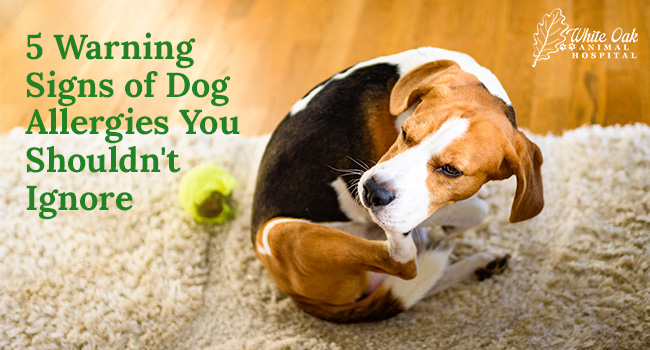
Canine health is significantly impacted by dog allergies, a prevalent concern among pet owners. Recognizing and promptly addressing allergic reactions in dogs is crucial for their well-being. Allergies in dogs can manifest in various ways, ranging from skin irritations to gastrointestinal and respiratory problems.
If left unaddressed, these allergic reactions can cause discomfort and distress to our beloved pets. Therefore, pet owners must be vigilant and observant of any signs indicating allergic reactions in their dogs. By understanding the common allergens affecting dogs and being proactive in seeking veterinary care, pet owners can effectively manage dog allergies and ensure the health and happiness of their canine companions.
Understanding Dog Allergies
Allergies in dogs often manifest through various symptoms affecting the skin, respiratory system, and digestive tract. Common signs of dog allergies include itching, redness, inflammation, hair loss, coughing, sneezing, vomiting, and diarrhea. These symptoms may vary in severity and can significantly impact the quality of life for affected dogs. Recognizing these signs and seeking veterinary advice promptly is crucial for managing dog allergies effectively and ensuring the well-being of our canine companions.
Breed Susceptibility
However, it’s essential to note that allergies can affect dogs of any breed or mix, and individual factors such as age, environment, and overall health also play significant roles. Understanding breed tendencies can help pet owners recognize potential allergy risks in their dogs and take proactive measures to effectively manage and mitigate allergic reactions.
Potential Triggers
5 Warning Signs of Dog Allergies You Shouldn’t Ignore
Skin Irritations and Redness
Skin irritations and redness are frequent indicators of allergic reactions in dogs. Allergens can trigger inflammation and discomfort, leading to visible changes in the skin’s appearance. Redness, swelling, and hot spots are common signs that suggest an allergic response. Hot spots, in particular, are localized areas of inflamed and infected skin that can cause intense itching and discomfort.
These symptoms may occur on various body parts, including the paws, ears, abdomen, and groin. Pet owners should monitor their dog’s skin condition regularly and seek veterinary attention if they notice persistent redness, irritation, or unusual skin texture changes. Early intervention is crucial for managing dog allergies effectively and ensuring the well-being of the canine companion.
Persistent Itching and Scratching
Dog owners should carefully observe their pet’s grooming habits and note any abnormal behavior related to itching or scratching. Consulting with a veterinarian is advisable if these symptoms persist, as prompt diagnosis and treatment are essential for managing dog allergies effectively. By addressing allergic reactions early on, pet owners can help alleviate their dog’s discomfort and prevent further complications.
Respiratory Problems
Respiratory problems in dogs, such as coughing, sneezing, and wheezing, can signal potential environmental allergies. These symptoms often arise when dogs inhale allergens like pollen, mold, or dust mites. Persistent coughing, especially if accompanied by wheezing sounds, may suggest irritation in the respiratory tract due to allergen exposure. Similarly, frequent sneezing can indicate the dog’s attempts to expel irritants from its nasal passages.
In more severe cases, dogs may exhibit labored breathing or shortness of breath, particularly during allergy seasons or in environments with high allergen concentrations. Pet owners should pay close attention to changes in their dog’s breathing patterns and seek veterinary advice promptly if respiratory symptoms persist or worsen. Early detection and management of environmental allergies are crucial for maintaining the dog’s respiratory health and overall quality of life.
Chronic Ear Infections
Additionally, dogs with allergic reactions may feel discomfort or pain when touching or manipulating their ears. Pet owners need to monitor their dog’s ear health regularly and seek veterinary attention if signs of chronic ear infections persist. Early diagnosis and management of allergic triggers can help alleviate discomfort and prevent complications associated with chronic ear infections in dogs.
Gastrointestinal Issues
Gastrointestinal problems, like vomiting, diarrhea, and flatulence, are critical indicators of dog allergies, particularly food ingredients. These discomforting symptoms arise when a dog’s digestive system reacts unfavorably to specific food components. Vomiting may occur shortly post-meal, while diarrhea presents as loose, watery stools. Additionally, heightened flatulence, often accompanied by abdominal discomfort, can signal food allergies.
Is your dog struggling with allergies? Learn how to ease their discomfort and boost their overall well-being with expert advice from holistic TCVM veterinarians. This comprehensive ebook on dog allergies provides practical at-home solutions to manage your dog’s symptoms effectively. Take advantage of the opportunity to download this invaluable resource instantly for a limited time. Co-authored by Dr. Casey Damron of White Oak Animal Hospital, this guide is your key to supporting your furry friend’s health and happiness.
GET “DOG ALLERGIES 101” FOR FREE
Frequently Asked Questions
What are the common signs of dog allergies?
Common signs of dog allergies include itching, redness, rashes, sneezing, coughing, and gastrointestinal issues such as vomiting or diarrhea.
Can dog allergies be cured completely?
While dog allergies cannot be completely cured, they can be effectively managed through various treatments and lifestyle changes. Identifying and avoiding allergens, medication, and immunotherapy are some strategies for managing dog allergies.
Are specific dog breeds more prone to allergies?
Certain dog breeds, such as retrievers, terriers, and bulldogs, are more prone to allergies due to genetic predispositions. However, allergies can affect dogs of any breed.